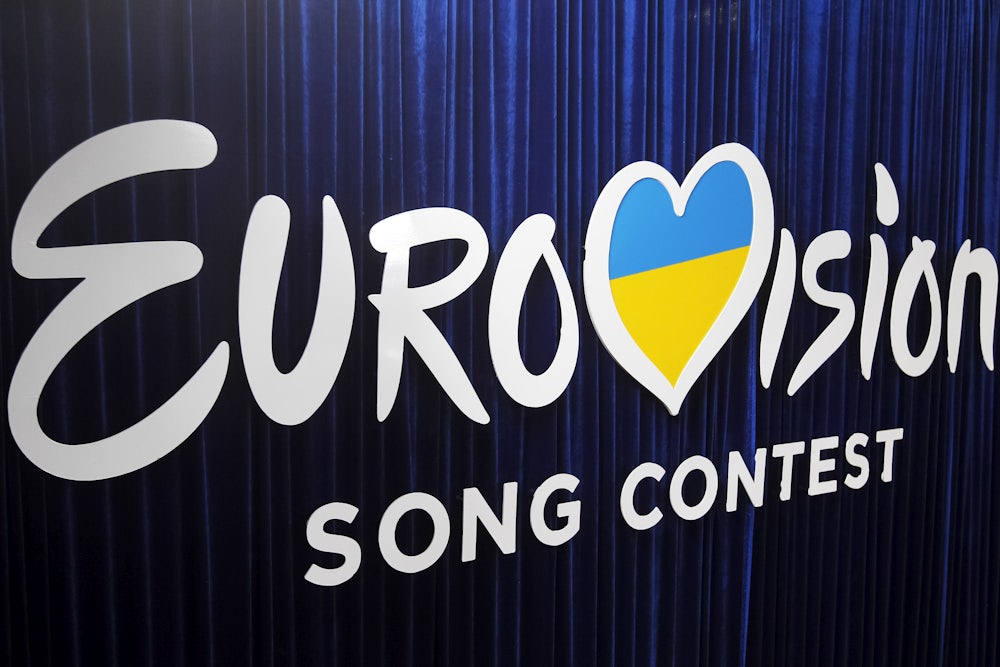While European nations may be dithering
on whether their outrage at Vladimir Putin’s invasion of Ukraine will translate
into a ban on importing Russian oil, their citizens this weekend are poised to
give a modest sign of solidarity to the Ukrainian people: a victory in the 2022
Eurovision Song Contest. If you live in the United States, odds are you’ve
never watched—and perhaps never even heard of—the annual competition, wherein
European countries (and, for some reason, Australia and Israel) face off musically,
one song per country. Created as a symbol of post–World War II continental solidarity, Eurovision
dates back to the 1950s and has gifted the world the brilliance of ABBA, Celine Dion, and the Chicken Lady. In February, the contest booted Russia
from participating, a rare move that is nonetheless in keeping with a certain
undeniable theme in the contest’s generally more frivolous history. For even as
Eurovision’s organizers have gone to strenuous, ridiculous lengths to try and
keep any hint of politics from the international broadcast, political
sympathies inevitably seem to influence its outcomes.
If the singing contest is niche in the U.S., it’s no small thing abroad: Over 180 million people watched the finals last year. It finally began to air in the U.S. in 2016, first on Logo, and is now viewable for subscribers of NBC’s Peacock streaming service. (Though for those with fewer scruples and more tech savvy, changing your geolocation with a VPN and watching Graham Norton’s snark on the BBC will still offer the best viewing experience.) But the event has never really caught on stateside. When the local version, American Song Contest, premiered in March on NBC, fewer people watched it during its time block than American Idol on ABC, 9-1-1 on Fox, or The Neighborhood on CBS—despite the fact that it was hosted by Snoop Dogg and Kelly Clarkson. “When the utterly cuckoo ‘Eurovision’ contest is your inspiration, how do you get off being so bland?” The Daily Beast asked of the premiere. If you have heard of the superior European version, it might be because Will Ferrell made a 2020 Netflix movie in which he plays a hapless entrant from Iceland—or because of last year’s winner, Italy’s rock group Måneskin, which surprisingly crossed over to U.S. airwaves and appeared on SNL.
Eurovision’s campy, over-the-top performances are its main draw. Overt pageantry is rewarded, and the quantity of free-flowing gender play would haunt Ron DeSantis’s nightmares. As NPR’s Glen Weldon recently said, after noting that the Americanized version lacked “frivolity,” the beauty of Eurovision is that it “is knowing, and self-aware, and constantly cheating to the camera to wink at you”—in other words, “a perfectly good workable definition of queer.” When a contestant sings about rising like a phoenix, you can be sure gigantic phoenix graphics will appear behind them. Unlike the staid performances of American Idol or The Voice, where competitors often sing near-interchangeable tunes, each year’s Eurovision offers a wide range of sounds, from straightforward would-be hits to absurd performance art: glitzy pop with cutesy dance routines; the inevitable Nordic death metal band pretending to be GWAR; painfully twee and earnest Portuguese crooners; dramatic fake sax solos; or stage bombing dancers in gorilla costumes. The winner is decided by a mix of a jury and fan vote from each nation, with points awarded during a prolonged, dramatic reveal by a representative from each country that somehow stays riveting despite dragging on for nearly an hour.
But beyond the ostentatious performances and elaborate production, what’s most fascinating is the geopolitical nature of the vote tallies. Countries tend to support their neighbors, and Russia often boasts a decent showing thanks to the solidarity of the Eastern bloc. Cyprus and Greece almost inevitably grant each other the most points, and despite Brexit it’s never a surprise when Ireland and the UK favor one another.
Even so, the European Broadcasting Union has for years gone to absurd, impractical lengths to keep overt politics out of the show. Palestinian and Basque flags are prohibited from appearing in the crowd. Georgia was banned from the 2009 competition—held in Moscow—because the lyrics were viewed as anti-Putin. After the crowd at the 2014 finals booed Russia—as a result of Putin’s decision to invade Crimea that year and his anti-LGBT domestic policy—the organizers installed “anti-booing” technology to drown out any negative noise the following year. “The European Broadcasting Union aims to assure that the Eurovision Song Contest is free from political statements, unauthorized commercial messages and offensive comments,” a spokesperson said in 2016. Despite the EBU’s best efforts, however, diplomatic tensions seep in—as they did that very year, when Ukraine’s Jamala won with “1944,” a song ostensibly about Stalin’s mass deportation of the population of Crimea that was also clearly a rebuke to Putin’s decision to invade the region two years prior.
At first, the contest was scheduled to proceed as normal this year, even after Russian troops had crossed into Ukraine. “The Eurovision Song Contest is a non-political cultural event which unites nations and celebrates diversity through music,” its organizers said in late February. But days after that initial equivocation, as the extent of Putin’s violent incursion became clear, the EBU banned Russia from the competition in Italy. The organizers probably believed, naïvely, that the disinvitation would be the end of geopolitics for the 2022 contest. Instead, the betting markets currently put Ukraine’s song as the clear favorite. (Ukraine has had some notoriously excellent entries in the past.) This year’s song, “Stefania” by Kalush Orchestra, is a perfectly fine but somewhat mediocre middle-of-the-pack crowd-pleaser, incorporating elements of traditional Ukrainian folk music with modern twists: requisite rap and flute-like instrumental breakdowns.
The band’s lead rapper wrote the song as an ode to his mother, but with lyrics such as “I’ll always find my way home, even if all roads are destroyed,” it took on new nuance after Putin began shelling civilian populations. “After it all started with the war and the hostilities,” he said, “it took on additional meaning, and many people started seeing it as their mother, Ukraine, in the meaning of the country. It has become really close to the hearts of so many people in Ukraine.” The fact that the song may win is as much about its musical quality as that it’s a chance for the rest of Europe to express its support for the war-torn country. Where once the EBU rightfully could have seen the competition as an early indicator of history’s march to unity—first as postwar Europe united and later, during the 1990s, with the post-Soviet states folded in—it’s no longer tenable for it to plug its ears and pretend that the moral arc is bending away from division.
Last year’s Ukrainian entry from Go_A finished fifth overall and second among fans. But since then, Go_A’s popularity has grown in Europe and the group has become outspoken about the invasion of its home. Last month, it released a new song, “Kalyna,” named after a tree that produces red berries and has long-standing symbolism and importance in Ukrainian culture. The proceeds of the song went to support Ukrainian efforts to fight off the Russian invasion. “According to our ancestors,” the band wrote in an Instagram post, “kalyna has a power that brings immortality and can unite generations to fight evil. The song ‘Kalyna’ is a message to the World that should be united for the future of humanity.”
Go_A’s lead singer, Kateryna Pavlenko, will come back to Eurovision as the country’s spokesperson this year to announce its vote total from the judges. (Jamala, who fled to Turkey after the invasion and has been performing at events to support the country, notably said she was not invited to Italy for the 2022 Eurovision finals.)
If European voters—both the judges and the votes tabulated by popular support—give “Stefania” the win, it would be a nice symbolic gesture and rebuke of the devastation Putin has wrought. But it also would pose a conundrum for next year’s competition. By tradition, the current winner gets to host the event the following year. Will Eurovision 2023 take place in a Kyiv that is free from the threat of invasion, and will Volodymyr Zelenskiy be unrestricted in his movements and able to welcome an international crowd to a once-again peaceful country? Or will a Putin puppet regime reign, one likely to stamp out any dissent? It’ll take a lot more than the moral support of phoning in a vote for Kalush Orchestra to make sure the former comes to pass.






